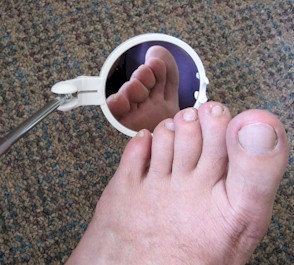
If you suffer from diabetes, issues such as nerve damage, circulation problems and infections can lead to serious foot problems unless you take proper care of your feet. To help you, we want to pass on a few suggestions which we hope will prevent severe foot problems from occurring.
Maintain a Healthy Lifestyle
To accomplish this we suggest:
- Regular medical checkups, including your feet, and these should include your ABCs (A1c, blood pressure and cholesterol).
- Daily monitoring of your blood sugar.
- Regular exercise.
- Eating a balanced diet rich in fruits and vegetables.
Some Healthy Foot Habits
Following these few simple habits will go a long way toward keeping your feet healthy.
- Antiseptic solutions can burn your feet, so don’t use them unless recommended by your doctor.
- Never use a hot water bottle, heating pad or electric blanket on your feet.
- Avoid walking barefooted, even in the house, as this can lead to sores, injuries and infections.
- Protect your feet from heat and cold.
- Don’t attempt to remove corns, calluses, warts or other foot lesions yourself. Don’t use liquid corn, callus and wart removers. See your podiatrist instead.
- Don’t sit with your legs crossed or stand in one position for extended periods of time.
Toenail Care
Taking good care of your toenails will help you avoid ulcers and other foot sores.
- Trim your toenails after washing your feet, when your nails are soft.
- To prevent ingrown toenails, trim straight across.
- Use an emery board to smooth the edges.
- Don’t cut your nails too short.
- Have a podiatrist trim your nails if you cannot see well or the nails are thick or yellowed.
Shoes and Socks
Here are a few suggestions concerning proper footwear.
- Choose comfortable, well-fitting shoes with plenty of toe room. Never buy tight-fitting shoes thinking they will stretch.
- Avoid thong sandals, flip-flops, pointed-toe and open-toed shoes, and high heels.
- Wear shoes you can adjust with laces, buckles or Velcro.
- If you have nerve damage, give your feet a break or change shoes every five hours or so to change the pressure points.
- Wear clean, dry socks or non-binding panty hose to provide an extra layer of comfort and protection between your feet and your shoes.
Finally, if you suffer any symptoms of foot problems, such as burning, tingling or painful feet, or the loss of sensation, contact us immediately. Delay could result in serious health complications.